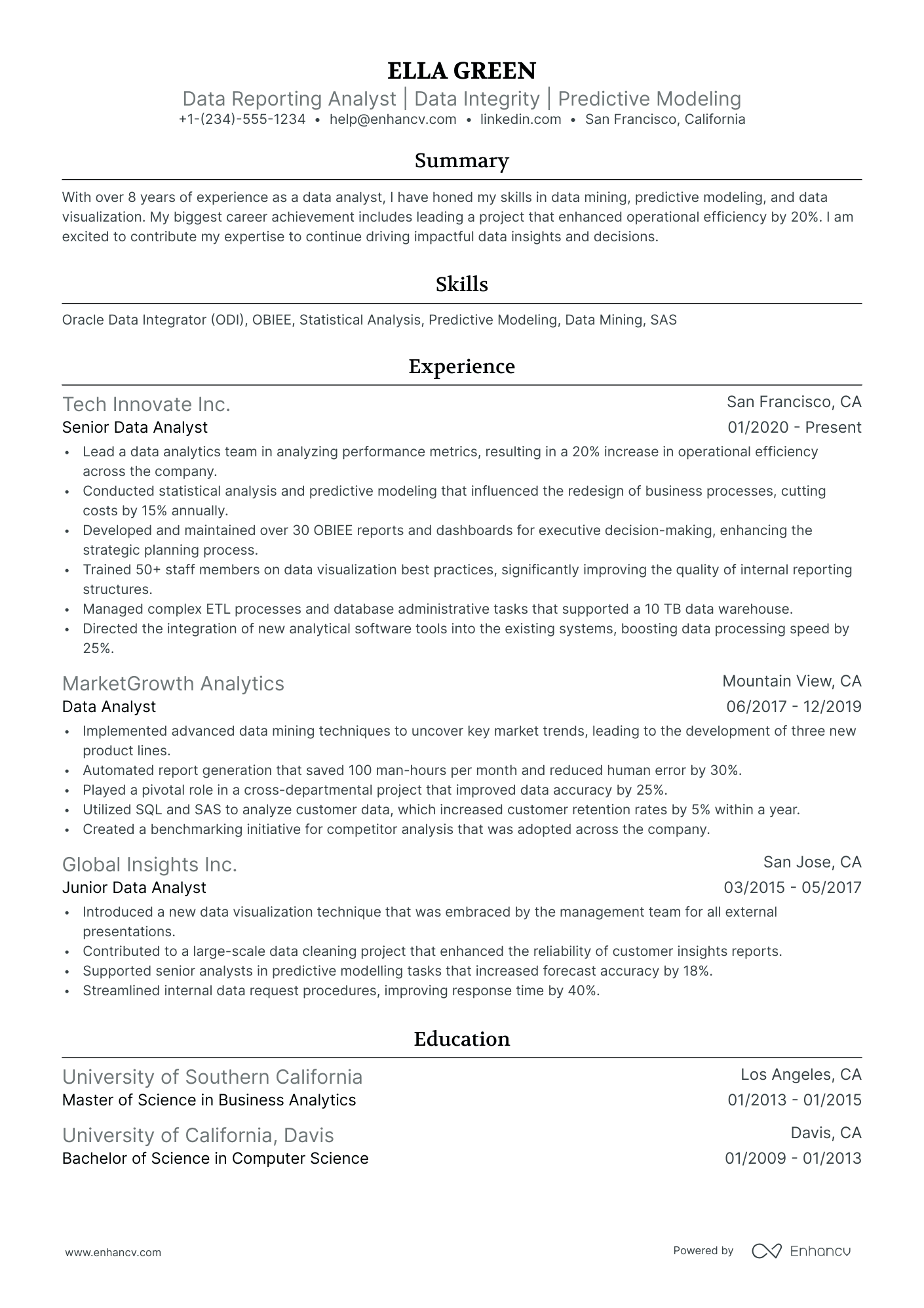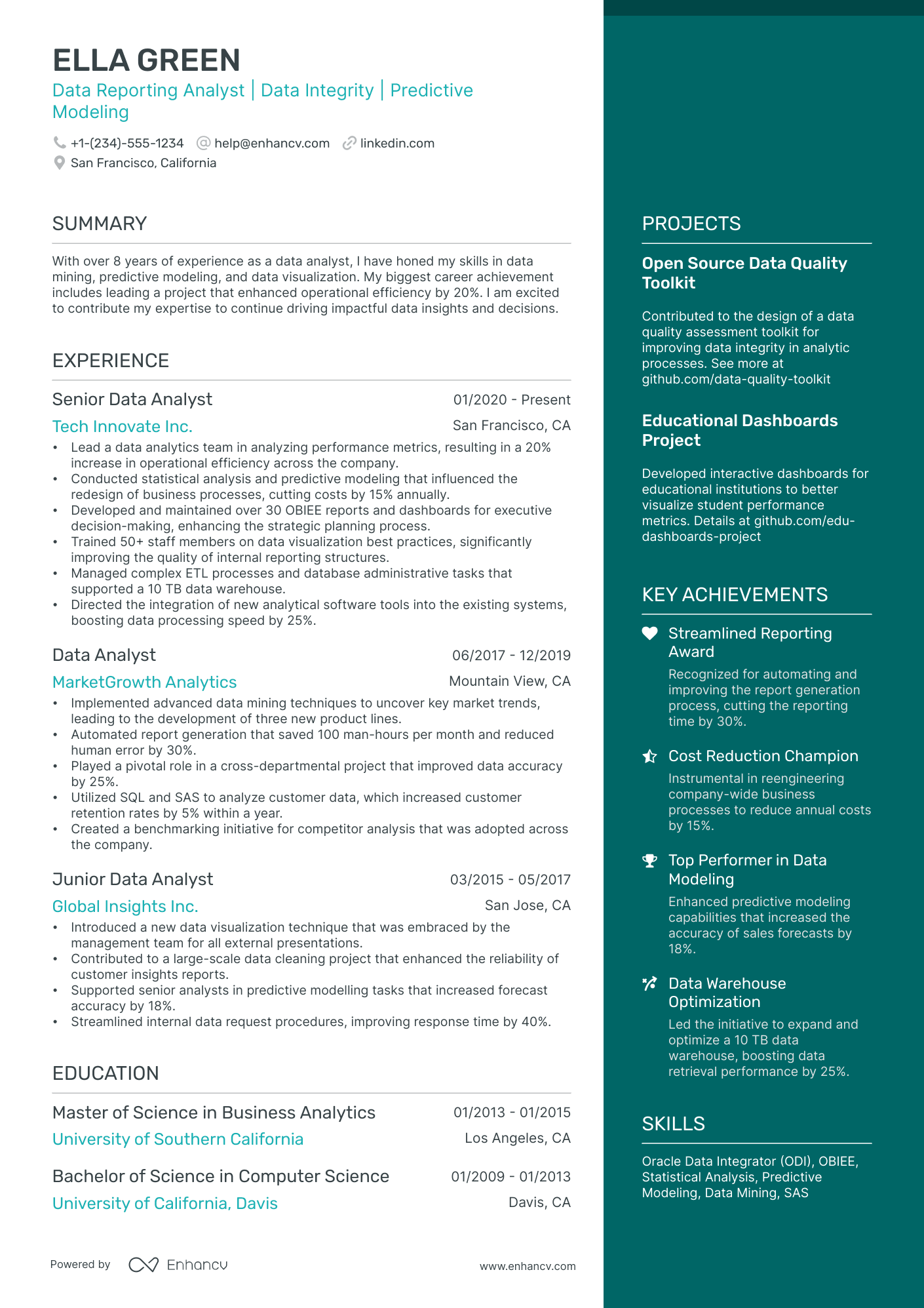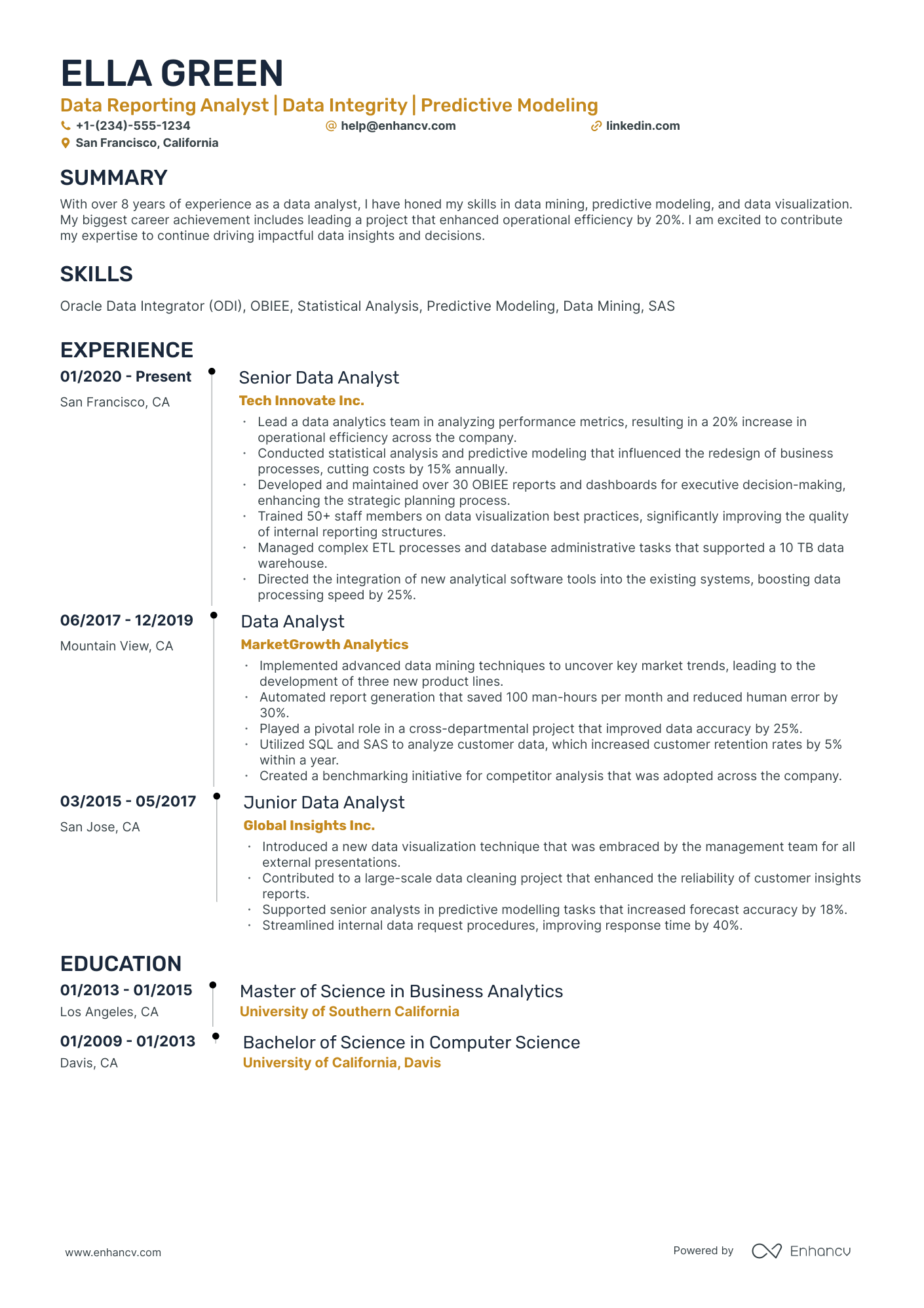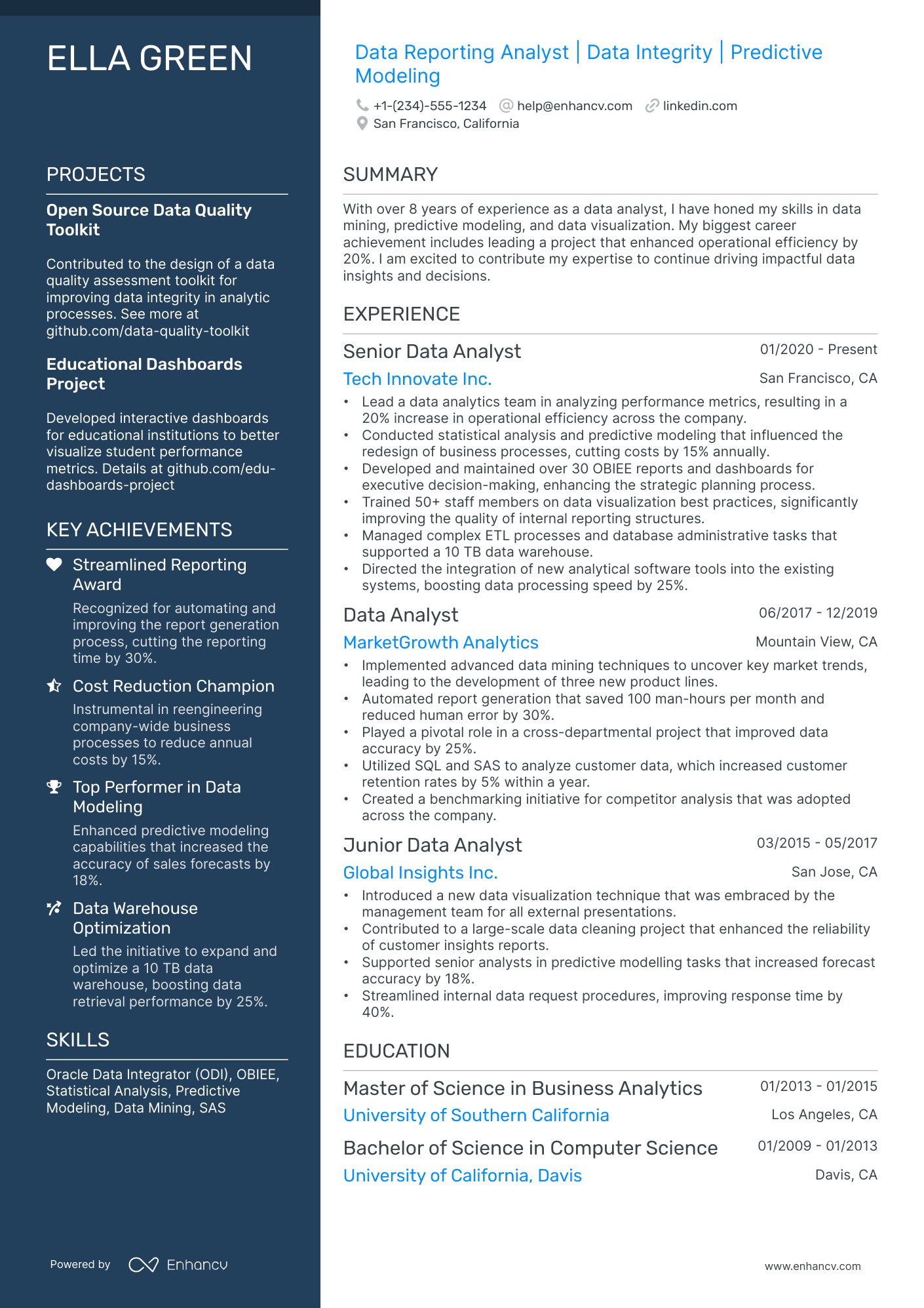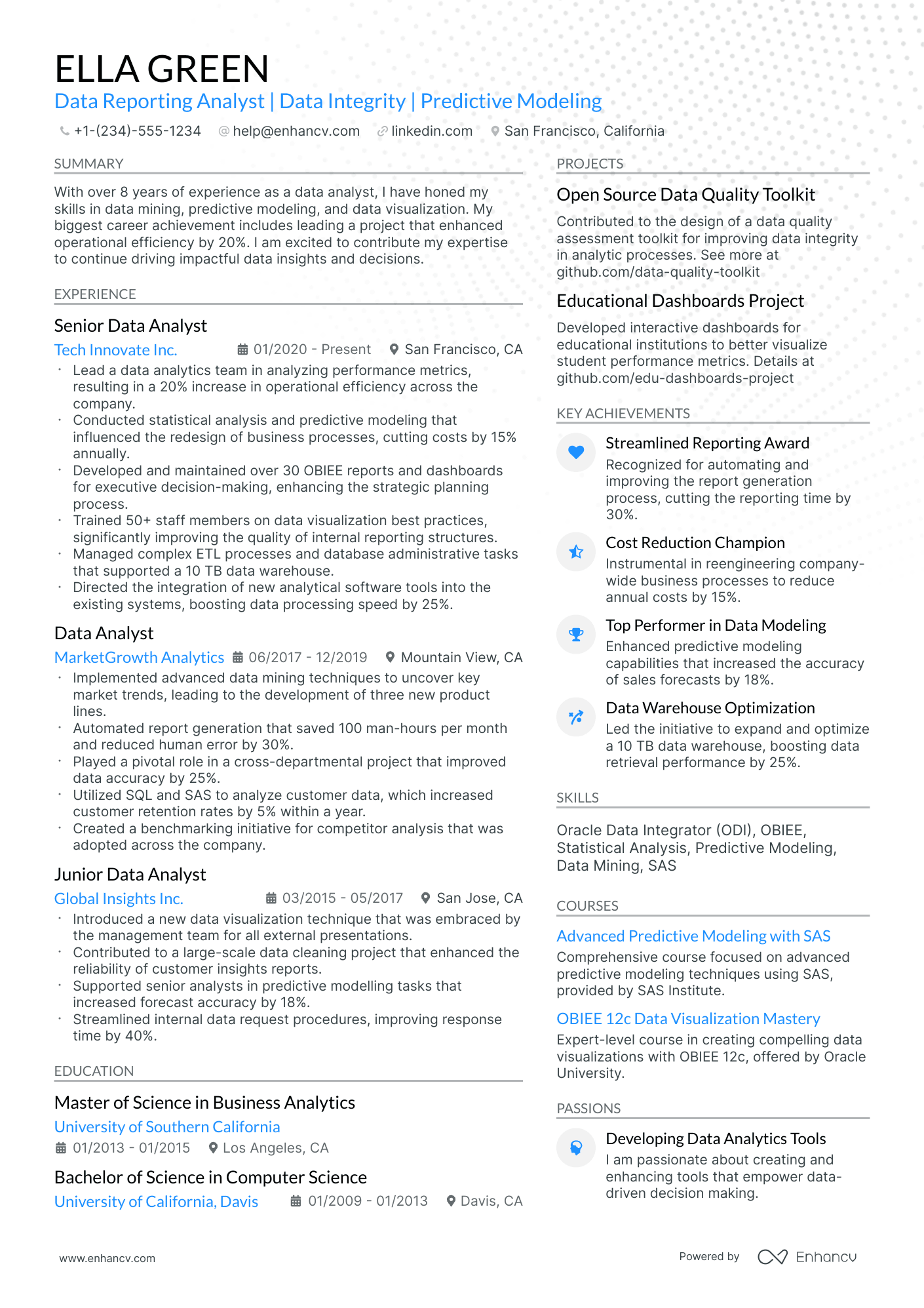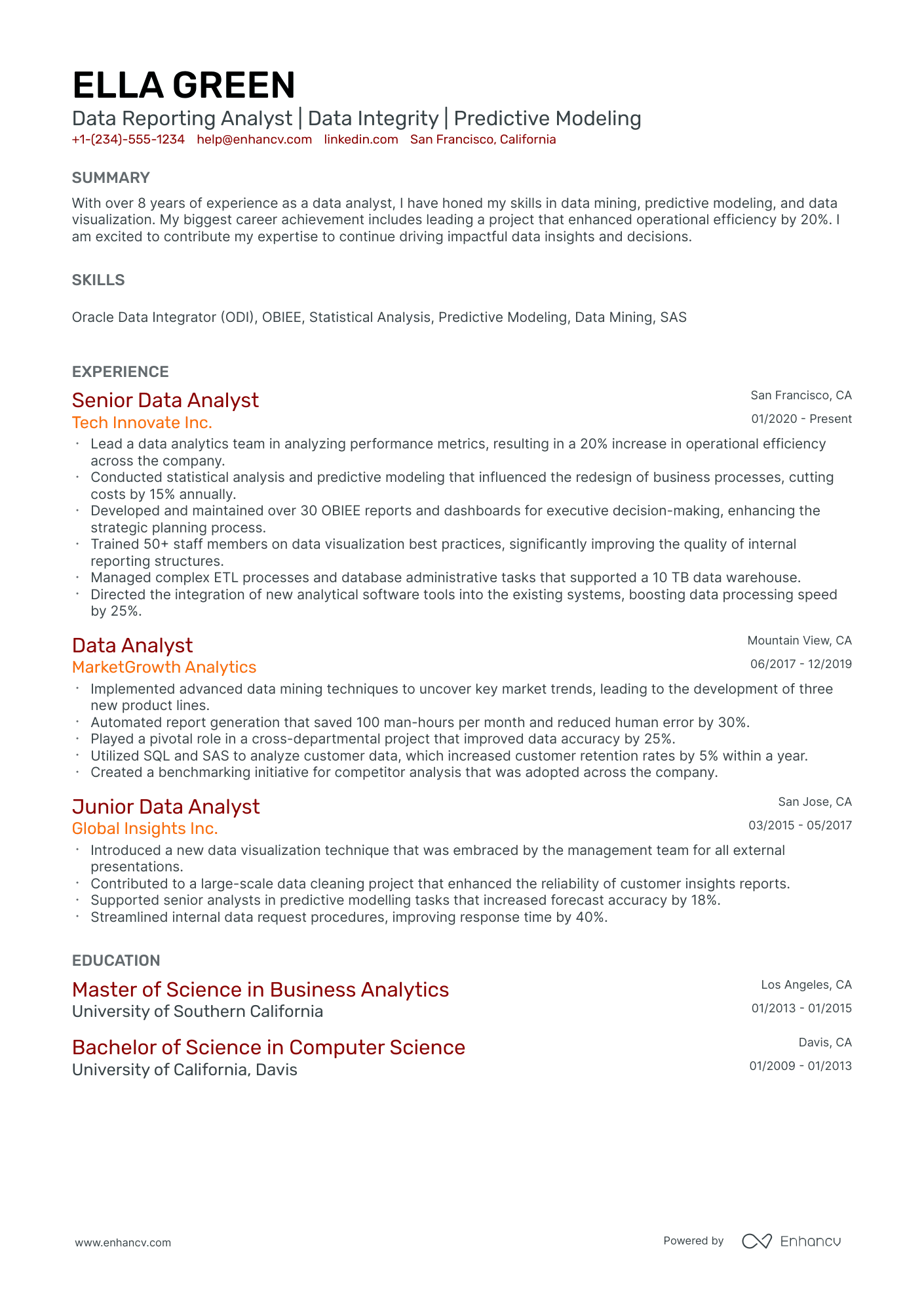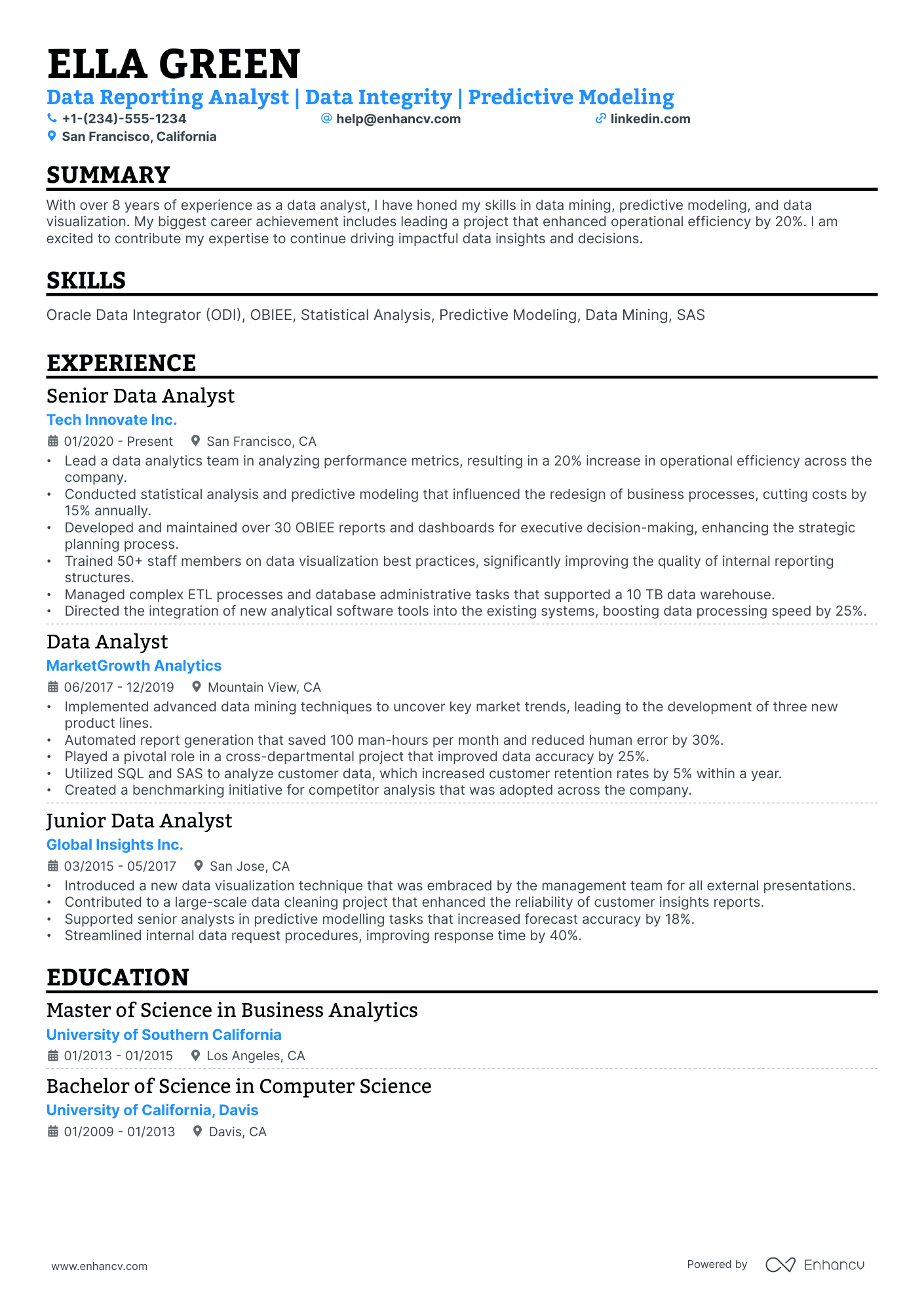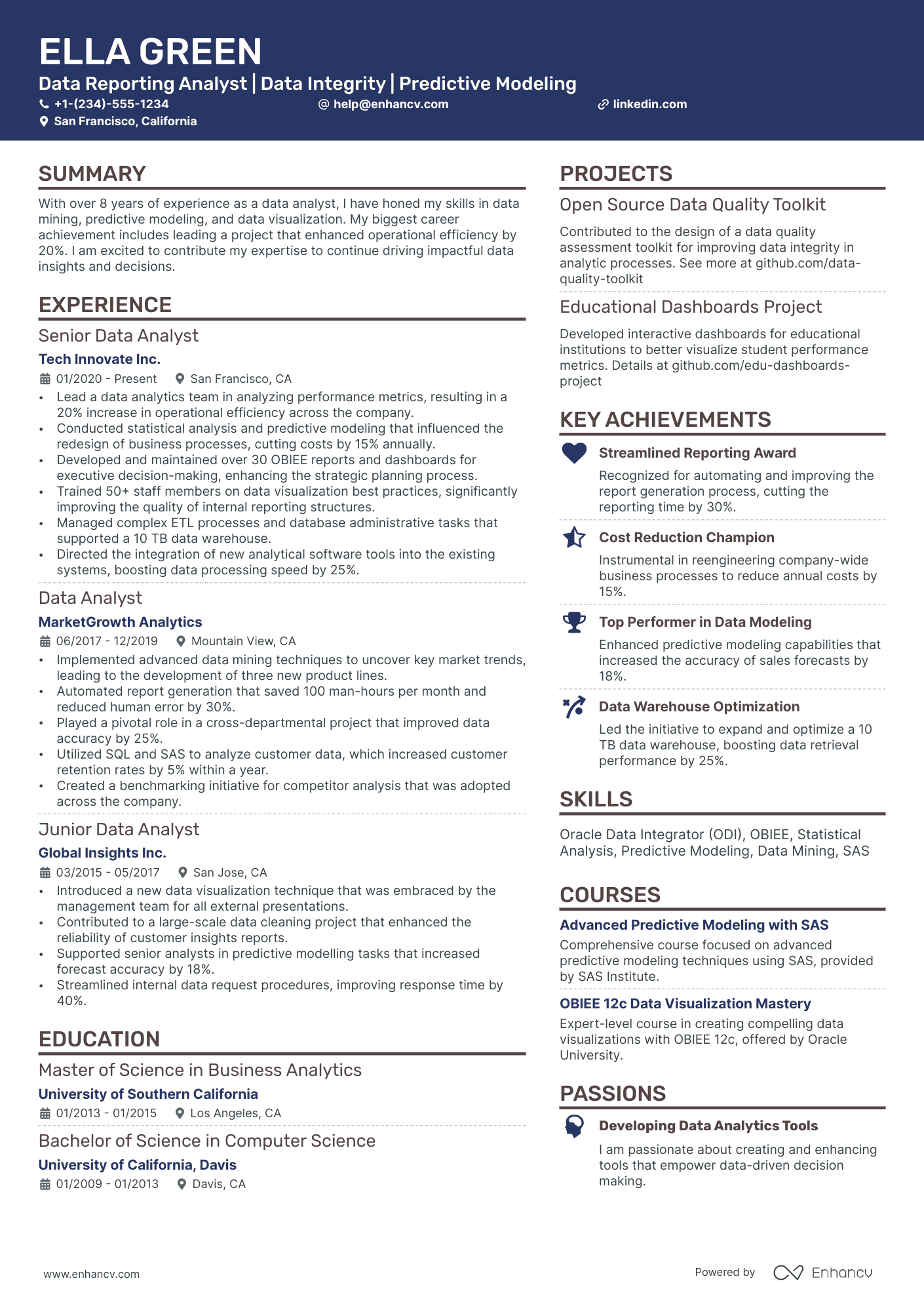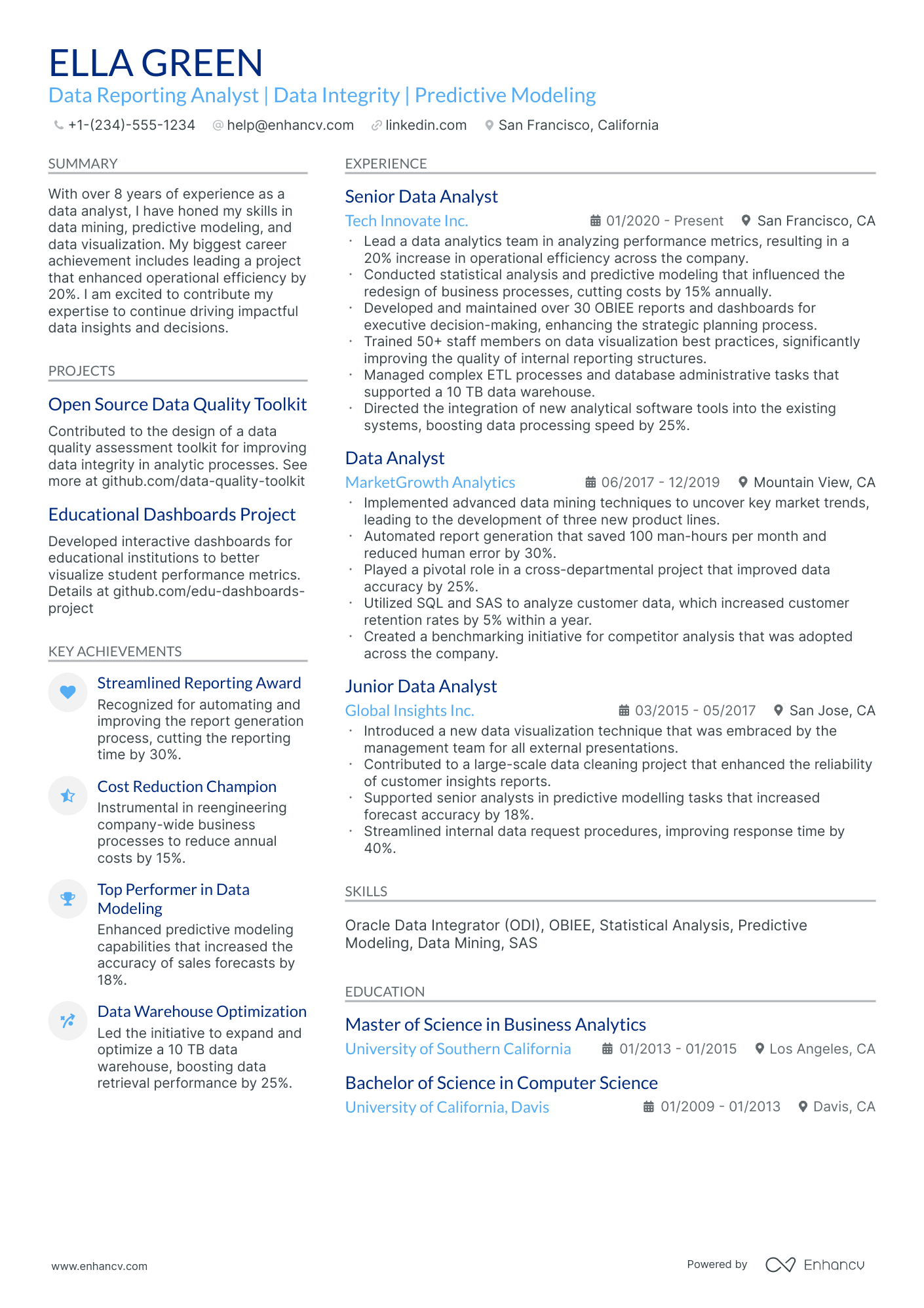As a data reporting analyst, articulating your complex technical skills and accomplishments on a resume can be challenging as you must strike a balance between detail and clarity. Our guide will provide you with targeted strategies to effectively showcase your analytics expertise and offer practical examples that demonstrate how to convey your data reporting impact succinctly to potential employers.
- Aligning the top one-third of your data reporting analyst resume with the role you're applying for.
- Curating your specific data reporting analyst experience to get the attention of recruiters.
- How to list your relevant education to impress hiring managers recruiting for the data reporting analyst role.
Discover more data reporting analyst professional examples to help you write a job-winning resume.
- Database Manager Resume Example
- Statistical Data Analyst Resume Example
- Data Center Technician Resume Example
- Azure Data Engineer Resume Example
- Data Manager Resume Example
- Data Warehouse Architect Resume Example
- Database Engineer Resume Example
- Data Entry Analyst Resume Example
- Database Assistant Resume Example
- Data Entry Clerk Resume Example
The ultimate formula for your data reporting analyst resume format
Our best advice on how to style your data reporting analyst resume is this - first, take the time to study the job advert requirements.
The resume format you select should ultimately help you better align how your experience matches the specific role.
There are four crucial elements you need to thus take into consideration:
- How you present your experience. If you happen to have plenty of relevant expertise, select the reverse-chronological resume format to organize your experience by dates, starting with the latest.
- Don't go over the top with writing your resume. Instead, stick with a maximum of two-page format to feature what matters most about your profile.
- Headers aren't just for "decoration". The header of your resume helps recruiters allocate your contact details, portfolio, and so much more.
- The PDF format rules. It's the most common practice to submit your data reporting analyst resume as a PDF so that your resume doesn't lose its layout. However, make sure the read the job well - in some instances, they might require a doc file.
Adjust your resume layout based on the market – Canadian resumes, for example, may follow a unique format.
Upload & Check Your Resume
Drop your resume here or choose a file. PDF & DOCX only. Max 2MB file size.
PRO TIP
Highlight any significant extracurricular activities that demonstrate valuable skills or leadership.
Fundamental sections for your data reporting analyst resume:
- The header with your name (if your degree or certification is impressive, you can add the title as a follow up to your name), contact details, portfolio link, and headline
- The summary or objective aligning your career and resume achievements with the role
- The experience section to curate neatly organized bullets with your tangible at-work-success
- Skills listed through various sections of your resume and within an exclusive sidebar
- The education and certifications for more credibility and industry-wide expertise
What recruiters want to see on your resume:
- Proficiency in data visualization tools such as Tableau, Power BI, or similar software to communicate complex data in a clear, concise, and decision-driving manner.
- Experience with SQL, Python, or R for querying databases, data manipulation, and analysis to showcase technical skills required for data manipulation and reporting.
- Demonstrated ability to create accurate, timely, and insightful reports, highlighting crucial business KPIs and metrics.
- Knowledge of statistical analysis and experience with statistical software tools to support data-driven decisions and reporting accuracy.
- Strong attention to detail and a track record of identifying and resolving errors in large datasets to ensure the integrity and reliability of reports.
Experts' advice on writing your data reporting analyst resume experience
While the excitement and motivation for writing your data reporting analyst resume was present in the first hour (or so), you now find yourself staring at the blank page.
The resume experience section is the one that allows you to make a memorable impression by matching job requirement with your past jobs and accomplishments.
To help you write this resume section, here are four mistakes you need to avoid:
- Listing every job you have had so far, including the irrelevant ones. Before that, consider each of your past roles based on relevancy to the role. It may be the case that the job you had 15 years ago may have taught you invaluable skills that are appropriate for the role;
- Including irrelevant work experience items. Those are past jobs that aren't linked with the role you're applying for (or so they seem). Consider how your past jobs will serve your professional presentation: will they be filling in a gap in your work history, or just taking up space?
- Focusing on responsibilities instead of accomplishments. Your data reporting analyst resume shouldn't just be telling recruiters what you did in the past - as it's most often the case that candidates have had similar responsibilities. But, rather, the experience section should showcase the success you've attained in each past role, thanks to your unique skill set;
- Consider listing just your professional experience. Any role you've had in the past - e.g. volunteering, internships, etc. - can make it into your data reporting analyst resume experience section. Make sure to include it alongside numbers and results.
Two more things you need to remember about your resume experience section.
The first are keywords. Or those specific job requirements that are crucial for the role . Ensure you've integrated them across your experience section to get sorted closer to the ideal candidate profile by the Applicant Tracker System (ATS).
The second are action verbs. Each of your experience bullets should start with a strong action verb, followed by your specific skill and your on the job achievements. Follow this formula to hint to recruiters what your unique value as a professional is.
Still with us? In the next section, we will show you how industry-leading professionals have avoided the four most common mistakes, while integrating keywords and action verbs in their experience section.
- Developed and maintained automated data reporting systems, increasing report generation efficiency by 40% for strategic decision-making.
- Conducted in-depth analysis of operational data from sales and marketing departments to identify trends and areas for improvement, which directly supported a 10% increase in quarter-over-quarter revenue.
- Collaborated with cross-functional teams to create custom reporting solutions that provided actionable insights, significantly improving project outcomes for key company initiatives.
- Designed a new data visualization dashboard that was adopted company-wide, enhancing communication and data accessibility for all departments.
- Led training sessions for over 50 staff members, improving company-wide data literacy and fostering a culture of informed decision-making.
- Managed the migration of reporting platforms to Tableau, which streamlined report generation and led to a 30% reduction in time spent on data management.
- Spearheaded the implementation of SQL Server Reporting Services, which enabled the automated generation of regulatory compliance reports.
- Identified key performance indicators for customer engagement, creating reports that provided insights leading to a 15% uplift in customer retention.
- Played a pivotal role in the data cleaning initiative which led to a 25% increase in data accuracy and integrity across the enterprise.
- Utilized Python and R scripts to automate complex data transformation processes, resulting in a 50% reduction in manual data handling errors.
- Developed custom ad-hoc reports for the finance department that supported the discovery of cost-saving opportunities amounting to $200K annually.
- Played an instrumental role in establishing a new reporting framework for the company's expanding online retail division, enhancing scalability and allowing for real-time insights.
- Crafted an automated early warning system using BI tools to monitor performance metrics, which reduced response times to critical issues by 35%.
- Provided analysis and reporting that supported a strategic partnership, influencing a 20% year-over-year growth in the number of active users.
- Initiated a data governance protocol that improved the quality of the reporting data sources and fostered trust in data-driven decision making.
- Managed and optimized a portfolio of 100+ reports for the healthcare analytics team, which influenced the redesign of patient care protocols.
- Integrated several disparate data systems into a cohesive reporting infrastructure that offered a unified view of key business metrics.
- Mentored junior analysts and conducted regular workshops to enhance team competencies in data visualization and reporting techniques.
- Led a project that automated the extraction, transformation, and loading (ETL) of data from various sources into reporting databases, significantly reducing processing times by 30%.
- Collaborated with the marketing team to develop a series of reports that tracked the effectiveness of different campaigns, aiding in a revised strategy that improved ROI by 17%.
- Conducted regular data audits and refined the data warehouse, ensuring a high level of data quality that supported all internal data reporting requirements.
- Implemented a new report scheduling system in Crystal Reports, cutting down on average report generation time from 5 hours to just 30 minutes.
- Analyzed customer interaction data and produced insights that led to redesigning the customer feedback process, improving overall satisfaction scores by 22%.
- Created a standardized set of reports for internal audits, which bolstered regulatory compliance and reduced the time taken for audit preparation by 40%.
- Pioneered the incorporation of machine learning models for predictive analytics in reports, positively impacting sales forecasts with a 95% confidence rate.
- Developed an interactive, real-time dashboard for supply chain logistics, resulting in optimized inventory levels and a 10% reduction in logistics costs.
- Produced in-depth competitor analysis reports that informed the executive team's market positioning strategy, leading to a 5% increase in market share.
- Championed the transition to cloud-based reporting tools, enhancing remote accessibility and collaboration among team members.
- Crafted detailed revenue and expenditure reports that helped streamline budgetary processes, contributing to a yearly savings of $300,000.
- Facilitated data-driven decisions by providing comprehensive dashboards on customer behavior analytics to senior management, influencing the direction of marketing strategies.
Quantifying impact on your resume
- Include the volume of data you have managed or analyzed to demonstrate your ability to handle large datasets effectively.
- Specify any improvements in data processing time or efficiency you achieved, showing your direct contribution to operational productivity.
- Present the number of reports or dashboards you have developed to highlight your experience and technical capabilities.
- List the percentage increase in data accuracy or quality you have contributed to, emphasizing your attention to detail and commitment to integrity.
- Mention the fiscal impact of your data insights by quantifying how you helped reduce costs or increase revenue.
- Enumerate the variety and number of data sources you have integrated, underlining your ability to work with complex information systems.
- Describe any predictive models or forecasts you've developed with metrics illustrating their accuracy and business impact.
- Cite specific examples of data-driven decisions influenced by your analytics, indicating your strategic value to the company.
Action verbs for your data reporting analyst resume
Making the most of your little to none professional experience
If you're hesitant to apply for your dream job due to limited professional experience, remember that recruiters also value the unique contributions you can offer.
Next time you doubt applying, consider this step-by-step approach for your resume's experience section:
- Rather than the standard reverse chronological order, opt for a functional-based format. This shifts the focus from your work history to your achievements and strengths;
- Include relevant internships, volunteer work, or other non-standard experiences in your data reporting analyst resume's experience section;
- Utilize your education, qualifications, and certifications to bridge gaps in your data reporting analyst resume experience;
- Emphasize your interpersonal skills and transferable skills from various industries. Often, recruiters seek a personality match, giving you an advantage over other candidates.
Recommended reads:
PRO TIP
Showcase any ongoing or recent educational efforts to stay updated in your field.
Data reporting analyst resume skills section: writing about your hard skills and soft skills
Recruiters always care about the skill set you'd bring about to the data reporting analyst role. That's why it's a good idea to curate yours wisely, integrating both hard (or technical) and soft skills. Hard skills are the technology and software you're apt at using - these show your suitability for the technical aspect of the role. They are easy to track via your experience, certifications, and various resume sections. Your soft skills are those personality traits you've gained over time that show how you'd perform in the specific team, etc. Soft skills are more difficult to qualify but are definitely worth it - as they make you stand out and show your adaptability to new environments. How do you build the skills section of your resume? Best practices point that you could:
- Include up to five or six skills in the section as keywords to align with the advert.
- Create a specific technical skills section to highlight your hard skills aptitude.
- Align the culture of the company you're applying to with your soft skills to determine which ones should be more prominent in your skills section.
- Make sure you answer majority of the job requirements that are in the advert within your skills section.
A data reporting analyst's resume requires a specific skill set that balances both industry-specific hard skills with personal, soft skills. Discover the perfect mix for the data reporting analyst role from our list:
Top skills for your data reporting analyst resume:
SQL
Microsoft Excel
Tableau
Power BI
Python
R
Data Visualization
ETL Tools
Google Analytics
Data Warehousing
Analytical Thinking
Attention to Detail
Problem-Solving
Communication Skills
Time Management
Collaboration
Critical Thinking
Adaptability
Creativity
Project Management
PRO TIP
Listing your relevant degrees or certificates on your data reporting analyst resume is a win-win situation. Not only does it hint at your technical capabilities in the industry, but an array of soft skills, like perseverance, adaptability, and motivation.
Discover the perfect certification and education to list on your data reporting analyst resume
Value the insights your resume education section offers. It can shed light on various proficiencies and experiences tailored for the job.
- Add only college or university degrees, stating the institution and duration.
- If you're nearing the end of your degree, note your graduation date.
- Weigh the pros and cons of including unrelated degrees - it might not be your best choice with so little space on your resume.
- Talk about your educational achievements if they amplify your relevant experience.
There are so many certificates you can list on your resume.
Just which ones should make the cut?
- List your prominent higher education degree in a separate box, alongside the name of the institute you've obtained it from and your graduation dates
- Curate only relevant certificates that support your expertise, hard skills, and soft skills
- Certificates that are more niche (and rare) within the industry could be listed closer to the top. Also, this space could be dedicated to more recent certifications you've attained
- Add a description to your certificates or education, only if you deem this could further enhance your chances of showcasing your unique skill set
When listing your certificates, remember that it isn't a case of "the more, the merrier", but rather "the more applicable they are to the industry, the better".
Recruiters have hinted that these are some of the most in-demand certificates for data reporting analyst roles across the industry:
The top 5 certifications for your data reporting analyst resume:
- Certified Data Professional (CDP) - Institute for Certification of Computing Professionals (ICCP)
- Microsoft Certified: Data Analyst Associate (MCDAA) - Microsoft
- Certified Analytics Professional (CAP) - INFORMS
- Tableau Desktop Certified Associate - Tableau
- Certification of Professional Achievement in Data Sciences - Columbia University
PRO TIP
If you happen to have plenty of certificates, select the ones that are most applicable and sought-after across the industry. Organize them by relevance to the role you're applying for.
Recommended reads:
Choosing between a data reporting analyst resume summary or objective
Many may argue that, in recent times, the data reporting analyst resume summary or objective has become completely obsolete.
But the reality is different as both of these resume sections provide you with an opportunity to :
- integrate data reporting analyst-vital keywords
- showcase your accomplishments
- answer why you're applying for this particular role.
The difference (between the summary and the objective) is that the:
- Resume objective puts your career goals in a more prominent position.
- Resume summary focuses more on career milestones.
We recommend you select the summary if you happen to have plenty of experience you'd like to spotlight from the very start of your data reporting analyst resume.
Meanwhile, the objective is ideal for those candidates who'd like to further prove their suitability for the role with their goals and soft skills.
We've featured some industry professional data reporting analyst resume samples to the best resume summary and objective structures:
Resume summaries for a data reporting analyst job
- With a robust 7-year tenure in financial analytics, I excel in transforming complex data sets into actionable insights. Expert in SQL, Python, and Power BI, I have spearheaded a department-wide automation project that resulted in a 20% increase in reporting efficiency at Fintech Solutions.
- Seasoned marketing strategist transitioning into data reporting, bringing over 8 years of experience in data-driven campaign management. Skilled in Google Analytics and tableau, my campaigns have consistently yielded a 30% increase in ROI for Gladstone Media’s clients.
- Having spent a decade in sales management, my pivot to data reporting is backed by a deep understanding of CRM systems like Salesforce, alongside advanced Excel skills. My strategic planning at Regional Apparel Inc. directly contributed to a 50% growth in lead conversion rates.
- A recent graduate with a Bachelor's in Computer Science, I am fueled by a passion for data analysis and a keen on developing expertise in reporting tools like Tableau and Microsoft Power BI. My academic projects have focused on harnessing data to drive decision-making processes.
- As a dedicated professional with 5 years of experience in data warehousing and business intelligence, with SQL and SAP as my forte, my analysis at DataCorp led to the discovery of cost-saving opportunities that slashed operational expenses by 15% within one fiscal year.
- Eager to transition from the dynamic world of freelance web development into data reporting, my adeptness in JavaScript and web analytics tools can provide fresh perspectives in data storytelling. I look forward to leveraging these skills to uncover valuable business insights.
Extra data reporting analyst resume sections and elements
Creating a winning data reporting analyst resume isn't about following a rigid formula. The key is to tailor it to the job requirements while maintaining your unique personality.
Consider including these additional resume sections to enhance your profile:
- Awards - Highlight industry-specific awards as well as any personal accolades to demonstrate recognition of your expertise and achievements;
- Hobbies and interests - Share your interests outside of work. This can provide insights into your personality and indicate whether you'd be a good cultural fit for the organization;
- Projects - Detail significant projects you've been involved in, focusing on your contributions and the outcomes;
- Publications - If you've authored or co-authored academic papers or other publications, include them to establish your credibility and in-depth knowledge of the field.
These sections can give a more comprehensive view of your capabilities and character, complementing the standard resume content.
Key takeaways
- Your resume layout plays an important role in presenting your key information in a systematic, strategic manner;
- Use all key resume sections (summary or objective; experience; skills; education and certification) to ensure you’ve shown to recruiters just how your expertise aligns with the role and why you're the best candidate;
- Be specific about listing a particular skill or responsibility you've had by detailing how this has helped the role or organization grow;
- Your personality should shine through your resume via the interests or hobbies, and strengths or accomplishments skills sections;
- Certifications go to provide further accreditation to your technical capabilities, so make sure you've included them within your resume.
